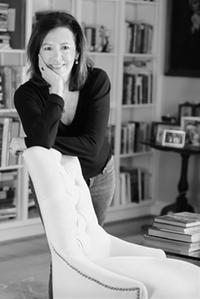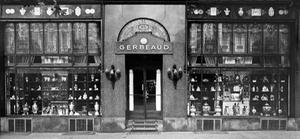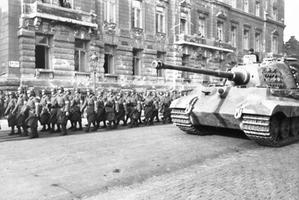
|
|
| photo: Route 1 Multimedia | |
Marianne Szegedy-Maszák is a journalist whose work has appeared in the New York Times Magazine, Esquire, the New Republic, Newsweek, the Los Angeles Times, the Bulletin of the Atomic Scientists and Psychology Today, among others. She has worked as a reporter at the New York Post, an editor at Congressional Quarterly, a professor of journalism at American University and as a senior writer at U.S. News & World Report. She has won awards for her journalism from the National Alliance for the Mentally Ill, the National Mental Health Association and the American Psychoanalytic Association. The recipient of a Pulitzer Traveling fellowship and the Alicia Patterson Foundation fellowship, Szegedy-Maszák has been an officer on the boards of the Center for Public Integrity and the Fund for Independence in Journalism. This is her first book.
In I Kiss Your Hands Many Times, you describe the emotional upheaval of translating your parents' love letters to each other. How did these feelings transform into a desire to share their story with the world?
In many ways, the experience of translating my parents' love letters actually made it possible for me to share their story with the world. As a journalist, and, of course, as a daughter, I always knew that the family story--that my Jewish mother and her family escaped while my Gentile father was sent to Dachau--before and during World War II was a great one. But I never knew how to begin or where I should train my focus on such a vast subject. The letters gave me a frame and a point of entry and, all of a sudden, my parents became the centerpiece of the narrative.
The amount of research you must have done for this book seems immense. Which family papers did you use, and how long did it take just to do the research?
I felt a huge responsibility as a writer and as a journalist to get the facts right and to help my readers understand the broader historical and cultural context in this complicated part of the world. My grandfather, uncle and father all had written memoirs or fragments of memoirs, but since I don't speak Hungarian, it all had to be translated. Then I went into the State Department archives just outside of Washington, D.C., and hired researchers in Budapest and London to go through the recently declassified files, not just from World War II but also from the postwar world. An archivist in the Hungarian section of the U.S. Holocaust Museum was extraordinarily helpful as well. And, of course, there is no shortage of books on this period. I interviewed experts and family members and traveled to Dachau and Budapest and Vienna. I was richly rewarded by people who were enormously generous with their time. The bulk of the research took about two years, but it never really stopped even as I was writing.
Uncovering the details of your family background seems to have been a significant personal journey for you.
It was a hugely significant personal journey. Nearly everyone I was writing about was dead, so the whole process of getting reacquainted with them changed and deepened my understanding of my family and of myself. I learned things that I never knew about my family, and I saw my parents and grandparents in completely new ways. I never realized that my grandparents had a troubled early marriage or how deeply they came to love each other. I never had seen my father as someone who took charge in any way. I saw how determined he could be as a political figure, and as a man in love with my mother. I felt as if I had spent my life being color blind, and suddenly was granted the ability to see the whole spectrum.
 How did the research change the way you think of your parents?
How did the research change the way you think of your parents?
My brothers and I grew up in a three-generation household, with my mother's parents and her sister living with us. That was a very rich experience in many ways, but my parents always seemed to be--in fact I think they actually were--marginal figures in that world. My father's experiences in a concentration camp, and his sense of failure when he was the ambassador from Hungary to the United States right after the war left him a rather depressed man. In that house, my mother was perpetually suspended among her roles as daughter, wife and mother. So I never really knew either of them with the kind of centrality that children usually know their parents. That changed when I wrote my book. I never dreamed that they loved each other so completely, or that they had gone through such difficult periods apart.
Your father played a significant, if thwarted, role in Hungarian politics. What is it like reconciling the father you knew with this public figure?
I always knew that he had once been an important man. But it was only when I was able to see him as an actor on the world stage--meeting Hitler, struggling with the politics of his country, trying to take a stand against the Nazis, nearly dying in Dachau--obviously not in real time, but with an immediacy and magnitude that letters and diaries and history confer, that I could appreciate, well, his greatness. And, in many ways, the real tragedy of his life.
Did your parents' story change the way you think of World War II?
World War II was never very distant in our household. It was maybe not a constant point of reference, but certainly a frequent one. But in working on my book, I deepened my understanding of the historical forces that converged on Hungary and saw how my parents and their families were affected. Those stories out of history books became much, much more personal. I could actually see the people I knew and loved living their lives as the war drew closer, leaving their beloved homes forever, hiding, wearing yellow stars, facing the SS. They never spoke about those experiences in much detail, but that only made what I learned more powerful for me.
 Is there something specific you would like Americans to understand about the experience of Hungary in World War II?
Is there something specific you would like Americans to understand about the experience of Hungary in World War II?
In that part of Central Europe, the old saying is, "Geography is destiny." If people think of Hungary at all--aside from the great food or how beautiful Budapest is--they think of it as being a German ally and the site of the breathtakingly efficient slaughter of 600,000 Hungarian Jews near the end of the war, when it seemed so clear that Germany had lost. But Hungary was never completely controlled by only terrible men. I would like Americans to understand that there were many people trying to change the course of history, that there were many in government, like my father, who opposed the Nazis, and that many Hungarians actually tried to save the Jews and get out of the German Alliance. But obviously, they failed.
Some terrible things happen in the family. Was it emotionally difficult writing about these episodes?
I don't want to sound melodramatic here, but I do remember sometimes writing with tears running down my cheeks. It was so painful to hear their voices in their letters and diaries, and to try to imagine how frightened they all must have been, how sick and broken my father, grandfather and uncles were after being detained in concentration camps. I knew them when all these were distant though powerful memories. I found myself wanting to step in and change the course of history as I was writing about it.
Were there discoveries you withheld from sharing in the book?
In many ways I think that I might have been a bit too candid! At least about my own growing up and my perceptions of how their lives influenced mine. I honestly can't think of any discoveries that I withheld. Doing so would have diminished the integrity of their story.
How has the process of discovering your family history and writing it all down influenced your life?
I have always wanted to make sense of the past, both historically and emotionally. In college, I didn't study journalism; I studied history. I have also always been very interested in what makes people tick, why do they do what they do, or avoid what they avoided. The process of delving into my family's history, learning so much about my parents and other family members, has changed in subtle and profound ways the way that I think about my family and somehow has freed me, personally and as a writer. --Ilana Teitelbaum

